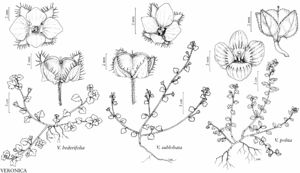Difference between revisions of "Veronica hederifolia"
Sp. Pl. 1: 13. 1753. (as hederaefolia)
FNA>Volume Importer |
imported>Volume Importer |
||
| (3 intermediate revisions by 2 users not shown) | |||
| Line 6: | Line 6: | ||
|place=1: 13. 1753 | |place=1: 13. 1753 | ||
|year=1753 | |year=1753 | ||
| + | |other_info_on_pub=(as hederaefolia) | ||
}} | }} | ||
|common_names=Ivy-leaved speedwell | |common_names=Ivy-leaved speedwell | ||
| Line 13: | Line 14: | ||
}}{{Treatment/ID/Special_status | }}{{Treatment/ID/Special_status | ||
|code=F | |code=F | ||
| − | |label= | + | |label=Illustrated |
}} | }} | ||
|basionyms= | |basionyms= | ||
| Line 31: | Line 32: | ||
|elevation=0–2000 m. | |elevation=0–2000 m. | ||
|distribution=B.C.;Ont.;Ala.;Ark.;Calif.;Conn.;Del.;D.C.;Fla.;Ga.;Ill.;Ind.;Kans.;Ky.;La.;Md.;Mich.;Mo.;Nebr.;N.J.;N.Y.;N.C.;Ohio;Okla.;Oreg.;Pa.;S.C.;S.Dak.;Tenn.;Utah;Va.;Wash.;W.Va.;Eurasia. | |distribution=B.C.;Ont.;Ala.;Ark.;Calif.;Conn.;Del.;D.C.;Fla.;Ga.;Ill.;Ind.;Kans.;Ky.;La.;Md.;Mich.;Mo.;Nebr.;N.J.;N.Y.;N.C.;Ohio;Okla.;Oreg.;Pa.;S.C.;S.Dak.;Tenn.;Utah;Va.;Wash.;W.Va.;Eurasia. | ||
| + | |introduced=true | ||
|tables= | |tables= | ||
|references= | |references= | ||
| Line 39: | Line 41: | ||
-->{{#Taxon: | -->{{#Taxon: | ||
name=Veronica hederifolia | name=Veronica hederifolia | ||
| − | |||
|authority=Linnaeus | |authority=Linnaeus | ||
|rank=species | |rank=species | ||
| Line 54: | Line 55: | ||
|publication title=Sp. Pl. | |publication title=Sp. Pl. | ||
|publication year=1753 | |publication year=1753 | ||
| − | |special status=Introduced; | + | |special status=Introduced;Illustrated |
| − | |source xml=https:// | + | |source xml=https://bitbucket.org/aafc-mbb/fna-data-curation/src/2e0870ddd59836b60bcf96646a41e87ea5a5943a/coarse_grained_fna_xml/V17/V17_762.xml |
|genus=Veronica | |genus=Veronica | ||
|species=Veronica hederifolia | |species=Veronica hederifolia | ||
Latest revision as of 19:36, 5 November 2020
Annuals. Stems decumbent to ascending, 5–40(–50) cm, eglandular-hairy. Leaves: blade suborbiculate, (3–)5-lobed, central lobe usually overtopping lateral ones, (5–)7–15(–20) × 8–16(–25) mm, base truncate, margins (3–)5-lobed, apex acute, surfaces sparsely eglandular-hairy. Racemes 1–10, terminal, 50–400(–500) mm, 5–20-flowered, axis eglandular-hairy; bracts suborbiculate, (3–)5-lobed, central lobe usually overtopping lateral ones, (5–)7–15(–20) mm. Pedicels patent or deflexed, (5–)9–15(–20) mm, equal to or ± shorter than subtending bract, length 2–3 times calyx, eglandular-hairy (in single line adaxially). Flowers: calyx lobes 5–6(–7) mm, apex acute, abaxial surface usually glabrous, ciliate with 25–35 hairs per side; corolla bright blue with bright white center, 5–7(–9) mm diam.; stamens sky blue, 0.7–1.2 mm; style (0.6–)0.7–0.9(–1.1) mm. Capsules ± round in cross section, ovoid, 3–4 × 4.5–6 mm, apex ± emarginate, glabrate. Seeds 1–4, bright yellow, ellipsoid to subglobular, urn-shaped, 2.3–3.3 × 2–3 mm, 1–2.2 mm thick, weakly cristate or rugose, ± smooth. 2n = 54 (Eurasia).
Phenology: Flowering (Feb–)Mar–Jun.
Habitat: Fields, lawns, gardens, ruderal places, vineyards, open forests, shady rocky places, dunes.
Elevation: 0–2000 m.
Distribution
Introduced; B.C., Ont., Ala., Ark., Calif., Conn., Del., D.C., Fla., Ga., Ill., Ind., Kans., Ky., La., Md., Mich., Mo., Nebr., N.J., N.Y., N.C., Ohio, Okla., Oreg., Pa., S.C., S.Dak., Tenn., Utah, Va., Wash., W.Va., Eurasia.
Discussion
Selected References
None.
